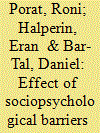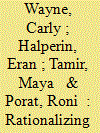|
|
|
Sort Order |
|
|
|
Items / Page
|
|
|
|
|
|
|
| Srl | Item |
| 1 |
ID:
137114


|
|
|
|
|
| Summary/Abstract |
During protracted intractable conflicts, society members develop a sociopsychological infrastructure that leads to selective and biased information processing, obstructing the penetration of new information that may facilitate peacemaking. To validate a process model that depicts the functioning of these barriers, we conducted a study among 207 Israeli Jews, focusing on the effects of long-term barriers on information processing. After measuring these barriers, we introduced an invented peace proposal and gave participants the option of processing additional information concerning its implications using the Decision Board Platform. Aided by this platform, we conducted an in-depth analysis of information acquisition strategies and found that four general worldviews (i.e., traditional and universal values, incremental theory, and authoritarianism) were associated with the ethos of conflict, which in turn was associated with the general amount and type of information processed. The theoretical and applied implications are discussed.
|
|
|
|
|
|
|
|
|
|
|
|
|
|
|
|
| 2 |
ID:
149477


|
|
|
|
|
| Summary/Abstract |
How does accountability impact political decisions? Though previous research on accountability has demonstrated its potential effects in the realms of business, elections, and more, very little research has explored the effect of citizen accountability in highly ideological, intractable, and political conflicts. This article addresses this issue, looking at the unique interaction between accountability and ideology on Israeli citizens’ political attitudes regarding the Israeli–Palestinian conflict. The results of two experimental studies in Israel reveal that accountable individuals behave in significantly more ideologically partisan ways than their nonaccountable counterparts. Moreover, this polarization is dependent on the specific conflict context, with leftists more affected by the issue of negotiations and rightists by security concerns. This signals that ideological polarization under accountability may depend on the “issue ownership” each ideological group feels toward the specific conflict context and its corresponding social goal of projecting ideological consistency on these issues.
|
|
|
|
|
|
|
|
|
|
|
|
|
|
|
|
|
|
|
|
|